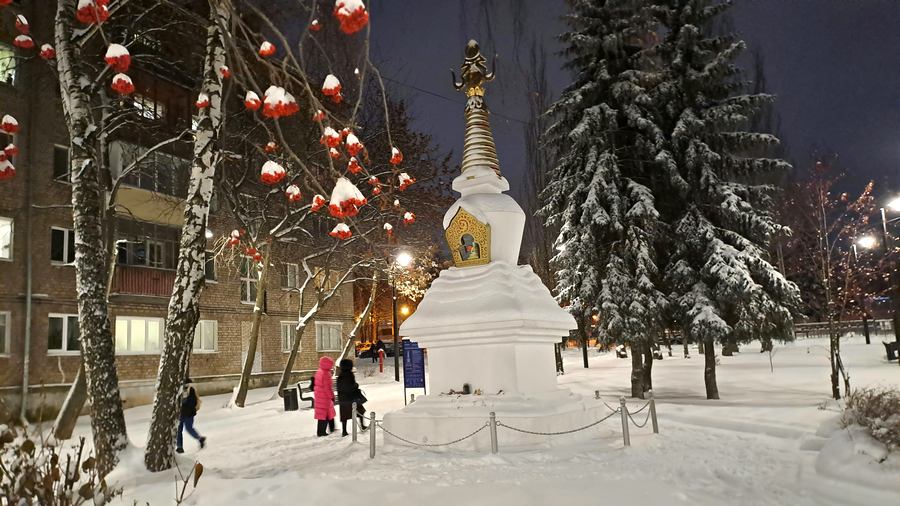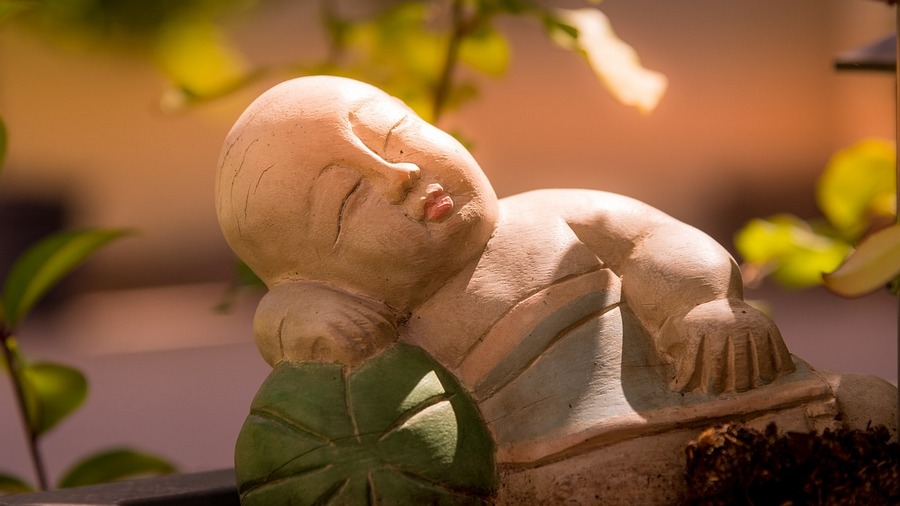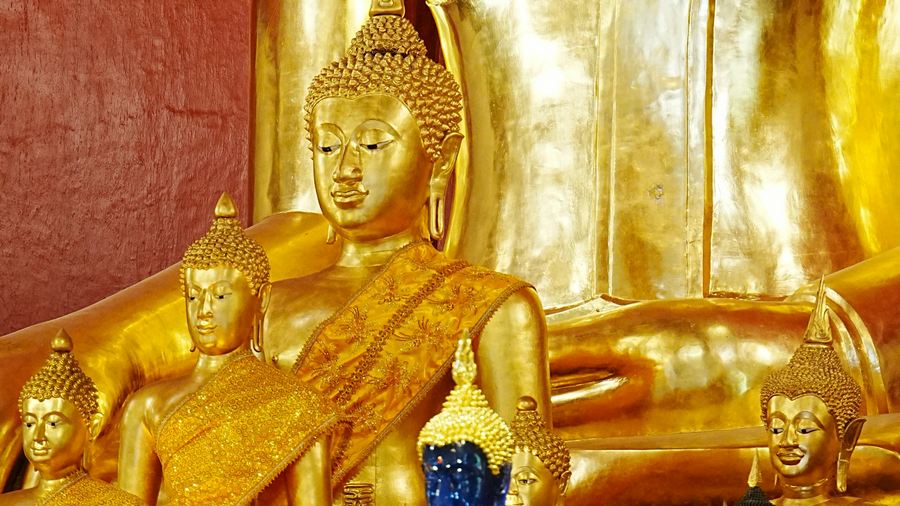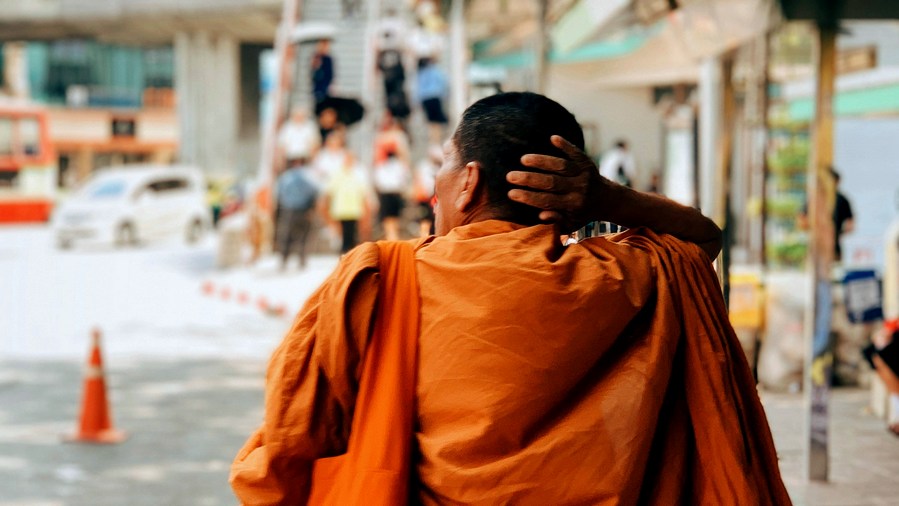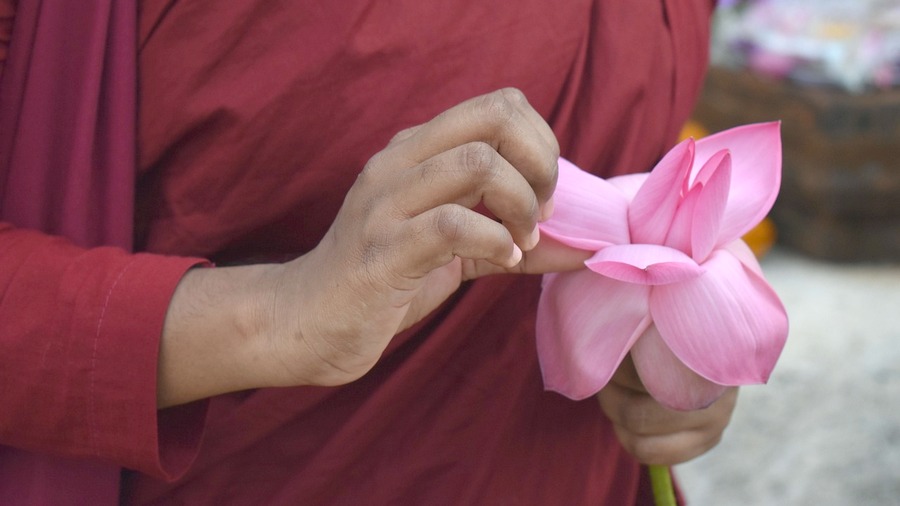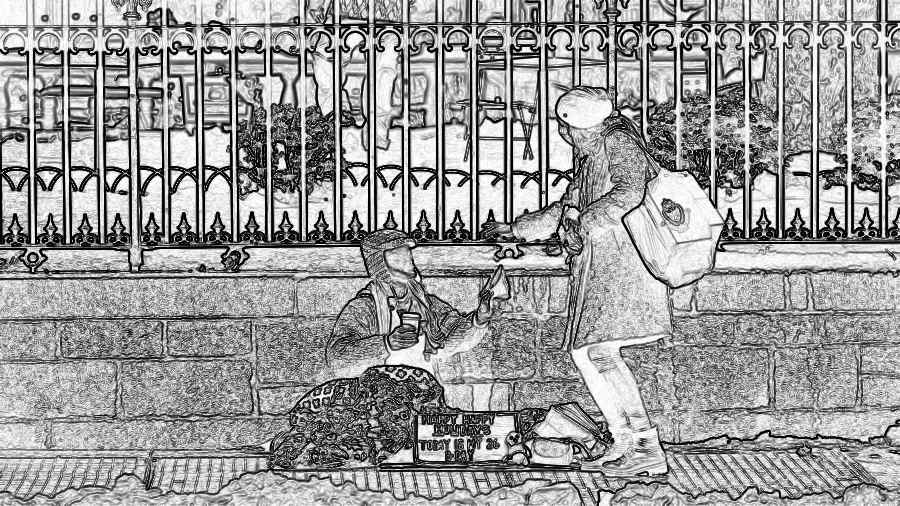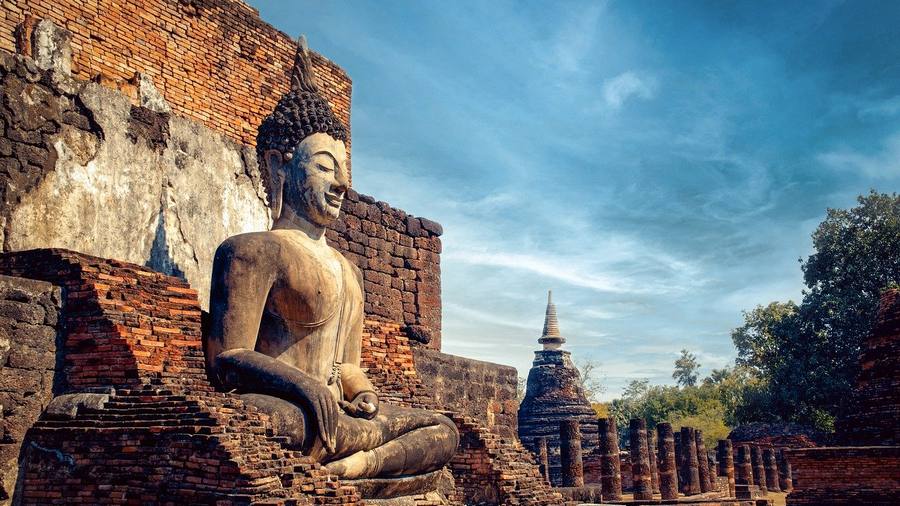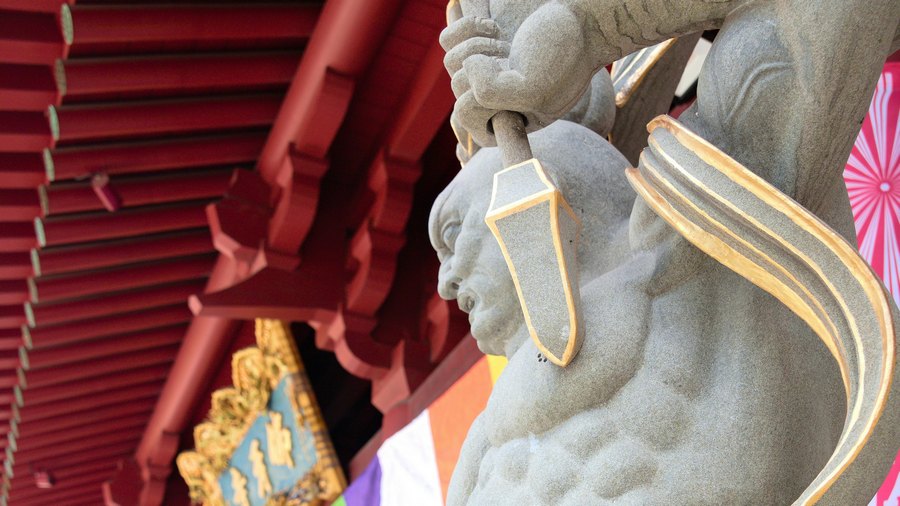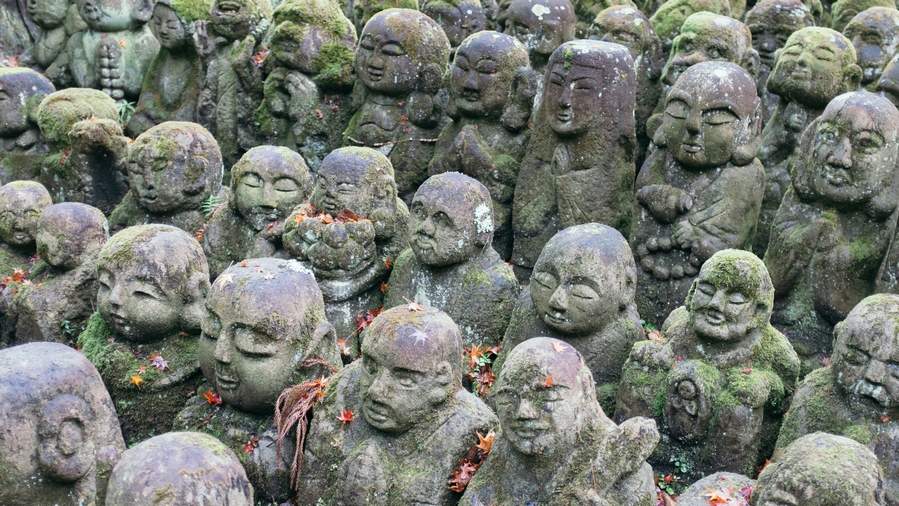On one occasion the Blessed One was dwelling at Vesālī in the hall with the peaked roof in the Great Wood. Then the male lay follower Vāseṭṭha approached the Blessed One, paid homage to him, and sat down to one side. The Blessed One then said to him:
“Vāseṭṭha, observed complete in eight factors, the uposatha is of great fruit and benefit, extraordinarily brilliant and pervasive. And how is the uposatha observed complete in eight factors, so that it is of great fruit and benefit, extraordinarily brilliant and pervasive?”
(1) “Here, bhikkhus, a noble disciple reflects thus: ‘As long as they live the arahants abandon and abstain from the destruction of life; with the rod and weapon laid aside, conscientious and kindly, they dwell compassionate toward all living beings. Today, for this night and day, I too shall abandon and abstain from the destruction of life; with the rod and weapon laid aside, conscientious and kindly, I too shall dwell compassionate toward all living beings. I shall imitate the arahants in this respect and the uposatha will be observed by me.’ This is the first factor it possesses.
(2) “‘As long as they live the arahants abandon and abstain from taking what is not given; they take only what is given, expect only what is given, and dwell honestly without thoughts of theft. Today, for this night and day, I too shall abandon and abstain from taking what is not given; I shall accept only what is given, expect only what is given, and dwell honestly without thoughts of theft. I shall imitate the arahants in this respect and the uposatha will be observed by me.’ This is the second factor it possesses.
(3) “‘As long as they live the arahants abandon sexual activity and observe celibacy, living apart, abstaining from sexual intercourse, the common person’s practice. Today, for this night and day, I too shall abandon sexual activity and observe celibacy, living apart, abstaining from sexual intercourse, the common person’s practice. I shall imitate the arahants in this respect and the uposatha will be observed by me.’ This is the third factor it possesses.
(4) “‘As long as they live the arahants abandon and abstain from false speech; they speak truth, adhere to truth; they are trustworthy and reliable, no deceivers of the world. Today, for this night and day, I too shall abandon and abstain from false speech; I shall speak truth, adhere to truth; I shall be trustworthy and reliable, no deceiver of the world. I shall imitate the arahants in this respect and the uposatha will be observed by me.’ This is the fourth factor it possesses.
(5) “‘As long as they live the arahants abandon and abstain from liquor, wine, and intoxicants, the basis for heedlessness. Today, for this night and day, I too shall abandon and abstain from liquor, wine, and intoxicants, the basis for heedlessness. I shall imitate the arahants in this respect and the uposatha will be observed by me.’ This is the fifth factor it possesses.
(6) “‘As long as they live the arahants eat once a day, abstaining from eating at night and from food outside the proper time. Today, for this night and day, I too shall eat once a day, abstaining from eating at night and from food outside the proper time. I shall imitate the arahants in this respect and the uposatha will be observed by me.’ This is the sixth factor it possesses.
(7) “‘As long as they live the arahants abstain from dancing, singing, instrumental music, and unsuitable shows, and from adorning and beautifying themselves by wearing garlands and applying scents and unguents. Today, for this night and day, I too shall abstain from dancing, singing, instrumental music, and unsuitable shows, and from adorning and beautifying myself by wearing garlands and applying scents and unguents. I shall imitate the arahants in this respect and the uposatha will be observed by me.’ This is the seventh factor it possesses.
(8) “‘As long as they live the arahants abandon and abstain from the use of high and luxurious beds; they lie down on a low resting place, either a small bed or a straw mat. Today, for this night and day, I too shall abandon and abstain from the use of high and luxurious beds; I shall lie down on a low resting place, either a small bed or a straw mat. I shall imitate the arahants in this respect and the uposatha will be observed by me.’ This is the eighth factor it possesses.
“It is in this way, Vāseṭṭha, that the uposatha is observed complete in eight factors, so that it is of great fruit and benefit, extraordinarily brilliant and pervasive.
“To what extent is it of great fruit and benefit? To what extent is it extraordinarily brilliant and pervasive? Suppose one were to exercise sovereignty and kingship over these sixteen great countries abounding in the seven precious substances, that is, the countries of the Aṅgans, the Magadhans, the Kāsis, the Kosalans, the Vajjis, the Mallas, the Cetis, the Vaṅgas, the Kurus, the Pañcālas, the Macchas, the Sūrasenas, the Assakas, the Avantis, the Gandhārans, and the Kambojans: this would not be worth a sixteenth part of the uposatha observance complete in those eight factors. For what reason? Because human kingship is poor compared to celestial happiness.
“For the devas ruled by the four great kings, a single night and day is equivalent to fifty human years; thirty such days make up a month, and twelve such months make up a year. The life span of those devas is five hundred such celestial years. It is possible, bhikkhus, for a woman or man who observes the uposatha complete in these eight factors, with the breakup of the body, after death, to be reborn in companionship with the devas ruled by the four great kings. It was with reference to this that I said human kingship is poor compared to celestial happiness.
“For the Tāvatiṁsa devas, a single night and day is equivalent to a hundred human years; thirty such days make up a month, and twelve such months make up a year. The life span of those devas is a thousand such celestial years. It is possible, bhikkhus, for a woman or man who observes the uposatha complete in these eight factors, with the breakup of the body, after death, to be reborn in companionship with the Tāvatiṁsa devas. It was with reference to this that I said human kingship is poor compared to celestial happiness.
“For the Yāma devas, a single night and day is equivalent to two hundred human years; thirty such days make up a month, and twelve such months make up a year. The life span of those devas is two thousand such celestial years. It is possible, bhikkhus, for a woman or man who observes the uposatha complete in these eight factors, with the breakup of the body, after death, to be reborn in companionship with the Yāma devas. It was with reference to this that I said human kingship is poor compared to celestial happiness.
“For the Tusita devas, a single night and day is equivalent to four hundred human years; thirty such days make up a month, and twelve such months make up a year. The life span of those devas is four thousand such celestial years. It is possible, bhikkhus, for a woman or man who observes the uposatha complete in these eight factors, with the breakup of the body, after death, to be reborn in companionship with the Tusita devas. It was with reference to this that I said human kingship is poor compared to celestial happiness.
“For the devas who delight in creation, a single night and day is equivalent to eight hundred human years; thirty such days make up a month, and twelve such months make up a year. The life span of those devas is eight thousand such celestial years. It is possible, bhikkhus, for a woman or man who observes the uposatha complete in these eight factors, with the breakup of the body, after death, to be reborn in companionship with the devas who delight in creation. It was with reference to this that I said human kingship is poor compared to celestial happiness.
“For the devas who control what is created by others, a single night and day is equivalent to sixteen hundred human years; thirty such days make up a month, and twelve such months make up a year. The life span of those devas is sixteen thousand such celestial years. It is possible, bhikkhus, for a woman or man who observes the uposatha complete in these eight factors, with the breakup of the body, after death, to be reborn in companionship with the devas who control what is created by others. It was with reference to this that I said human kingship is poor compared to celestial happiness.”
One should not kill living beings or take what is not given;
one should not speak falsehood or drink intoxicants;
one should refrain from sexual activity, from unchastity;
one should not eat at night or at an improper time.
One should not wear garlands or apply scents;
one should sleep on a low bed or a mat on the ground;
this, they say, is the eight-factored uposatha
proclaimed by the Buddha,
who reached the end of suffering.
As far as the sun and moon revolve,
shedding light, so beautiful to gaze upon,
dispellers of darkness, moving through the firmament,
they shine in the sky, brightening up the quarters.
Whatever wealth exists in this sphere—
pearls, gems, and excellent beryl,
horn gold and mountain gold,
and the natural gold called haṭaka—
those are not worth a sixteenth part
of an uposatha complete in the eight factors,
just as all the hosts of stars
do not match the moon’s radiance.
Therefore a virtuous woman or man,
having observed the uposatha complete in eight factors
and having made merit productive of happiness,
blameless goes to a heavenly state.
When this was said, the male lay follower Vāseṭṭha said to the Blessed One: “Bhante, if my beloved relatives and family members would observe the uposatha complete in eight factors, that would lead to their welfare and happiness for a long time. If all khattiyas would observe the uposatha complete in eight factors, that would lead to their welfare and happiness for a long time. If all brahmins … vessas … suddas would observe the uposatha complete in eight factors, that would lead to their welfare and happiness for a long time.”
“So it is, Vāseṭṭha, so it is! If all khattiyas would observe the uposatha complete in eight factors, that would lead to their welfare and happiness for a long time. If all brahmins … vessas … suddas would observe the uposatha complete in eight factors, that would lead to their welfare and happiness for a long time. If the world with its devas, Māra, and Brahmā, this population with its ascetics and brahmins, its devas and humans, would observe the uposatha complete in eight factors, that would lead to the welfare and happiness of the world for a long time. If these great sal trees would observe the uposatha complete in eight factors, that would lead to the welfare and happiness of these great sal trees for a long time, if they could choose. How much more then for a human being!”
Read this translation of Aṅguttara Nikāya 8.44 Vāseṭṭhasutta: Vāseṭṭha by Bhikkhu Bodhi on SuttaCentral.net. Or read a different translation on SuttaCentral.net. Or listen on SC-Voice.net. Or explore the Pali on DigitalPaliReader.online.
Or read a translation in Deutsch, বাংলা, Español, Bahasa Indonesia, 日本語, မြန်မာဘာသာ, Русский, සිංහල, ไทย, Tiếng Việt, or 汉语. Learn how to find your language.

